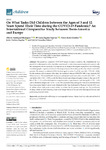On What Tasks Did Children between the Ages of 3 and 12 Years Spend their Time during the COVID-19 Pandemic? An International Comparative Study between Ibero-America and Europe

Use this link to cite
http://hdl.handle.net/2183/31164Collections
- Investigación (FEDU) [938]
Metadata
Show full item recordTitle
On What Tasks Did Children between the Ages of 3 and 12 Years Spend their Time during the COVID-19 Pandemic? An International Comparative Study between Ibero-America and EuropeAuthor(s)
Date
2022Citation
Sanmiguel-Rodríguez, A.; Zagalaz-Sánchez,M.L.; Arufe-Giráldez, V.; Cachón-Zagalaz, J.; González-Valero, G. On What Tasks Did Children between the Ages of 3 and 12 Years Spend Their Time during the COVID-19 Pandemic? An International Comparative Study between Ibero-America and Europe. Children 2022, 9, 971. https:// doi.org/10.3390/children9070971
Abstract
[Abstract] The pandemic caused by COVID-19 meant, in many countries, the establishment of a period of confinement in which families were forced to restrict movement and social contacts with the consequent risk of inactivity. Our objective as to analyze the degree of psychosocial well-being, sociodemographic aspects and use of technological means depending on the educational level of the parents. The sample consisted of 2316 children aged between 3 and 12 years (M = 7.70; SD = 2.86). For the analysis and treatment of the data, the statistical software SPSS 25.0 (IBM Corp, Armonk, NY, USA) was used. We found that the European participants used more video consoles (M = 0.89 ± 1.33) and tablets (M = 1.30 ± 0.95), while the Ibero-Americans obtained higher values in the use of TV (M = 2.28 ± 1.10) and levels higher in a negative state of psychosocial well-being (M = 7.29 ± 1.07) and in tiredness/fatigue (M = 4.34 ± 2.44). We concluded that, during the period of confinement in European areas, higher values were obtained in the time dedicated to Physical Activity (PA), use of tablets, school task performance, artistic activities, family games, reading, free play and hours of sleep; while in Ibero-America, there were longer times in the use of technological devices and performing domestic tasks.
Keywords
Psychosocial well-being
Sociodemographic factors
Physical activity
Educational level of the parents
COVID-19
Sociodemographic factors
Physical activity
Educational level of the parents
COVID-19
Description
This article belongs to the Special Issue The Impact of COVID-19 in Children
Editor version
Rights
Atribución 4.0 Internacional






